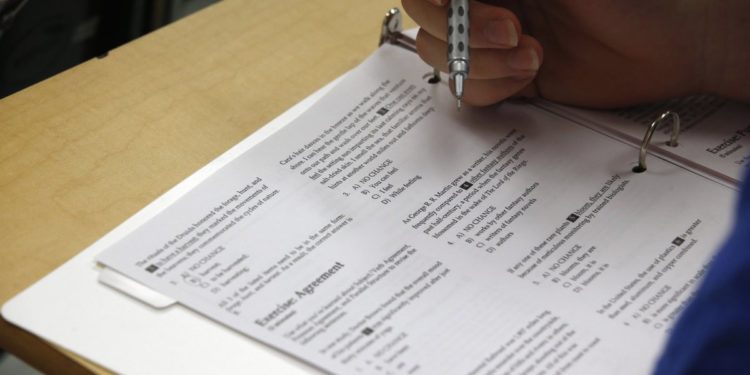[ad_1]
Scientists say they’ve developed a framework to make computer algorithms “safer” to make use of with out creating bias based mostly on race, gender or different components. The trick, they are saying, is to make it attainable for customers to inform the algorithm what sorts of pitfalls to keep away from — with out having to know so much about statistics or synthetic intelligence.
With this safeguard in place, hospitals, firms and different potential customers who could also be cautious of placing machine studying to make use of may discover it a extra palatable device for serving to them resolve issues, in line with a report on this week’s version of the journal Science.
Laptop algorithms are used to make choices in a variety of settings, from courtrooms to varsities to on-line buying websites. The applications type by enormous quantities of knowledge in quest of helpful patterns that may be utilized to future choices.
However researchers have been wrestling with an issue that’s turn out to be more and more troublesome to disregard: Though the applications are automated, they typically present biased outcomes.
For instance, an algorithm used to find out jail sentences predicted greater recidivism charges for black defendants discovered responsible of crimes and a decrease danger for white ones. These predictions turned out to be improper, in line with a ProPublica evaluation.
Biases like this typically originate in the true world. An algorithm used to find out which sufferers have been eligible for a well being care coordination program was under-enrolling black sufferers largely as a result of the code relied on real-world well being spending information — and black sufferers had fewer dollars spent on them than whites did.
Even when the knowledge itself isn’t biased, algorithms can nonetheless produce unfair or different “undesirable outcomes,” stated Philip Thomas, a synthetic intelligence researcher on the College of Massachusetts Amherst and lead creator of the brand new examine.
Finding out which processes may be driving these unfair outcomes, after which fixing them, will be an amazing process for medical doctors, hospitals or different potential customers who simply desire a device that may assist them make higher choices.
“They’re the specialists of their subject however maybe not in machine studying — so we shouldn’t count on them to have detailed data of how algorithms work in an effort to management the conduct of the algorithms,” Thomas stated. “We wish to give them a easy interface to outline undesirable conduct for his or her utility after which be certain that the algorithm will keep away from that conduct with excessive likelihood.”
So the pc scientists developed a unique kind of algorithm that allowed customers to extra simply outline what dangerous conduct they needed their program to keep away from.
This, after all, makes the algorithm designers’ job harder, Thomas stated, as a result of they should construct their algorithm with out figuring out what biases or different problematic behaviors the eventual consumer received’t need in this system.
“As a substitute, they should make the algorithm good sufficient to know what the consumer is saying is undesirable conduct, after which cause completely by itself about what would trigger this conduct, after which keep away from it with excessive likelihood,” he stated. “That makes the algorithm a bit extra difficult, however a lot simpler for individuals to make use of responsibly.”
To check their new framework, the researchers tried it out on a dataset of entrance examination scores for 43,303 Brazilian college students and the grade level averages they earned throughout their first three semesters in school.
Commonplace algorithms that attempted to foretell a pupil’s GPA based mostly on his or her entrance examination scores have been biased in opposition to girls: The grades they predicted for girls have been decrease than have been really the case, and the grades they predicted for males have been greater. This induced an error hole between women and men that averaged zero.three GPA factors — sufficient to make a significant distinction in a pupil’s admissions prospects.
The brand new algorithm, alternatively, shrank that error vary to inside zero.05 GPA factors — making it a a lot fairer predictor of scholars’ success.
The pc scientists additionally tried out their framework on simulated information for diabetes sufferers. They discovered it may regulate a affected person’s insulin doses extra successfully than a regular algorithm, leading to far fewer undesirable episodes of hypoglycemia.
However others questioned the brand new strategy.
Dr. Leo Anthony Celi, an intensivist at Beth Israel Deaconess Medical Heart and analysis scientist at MIT, argued that the easiest way to keep away from bias and different issues is to maintain machine studying specialists within the loop all through the whole course of fairly than limiting their enter to the preliminary design levels. That manner they’ll see if an algorithm is behaving badly and make any needed fixes.
“There’s simply no manner round that,” stated Celi, who helped develop a synthetic intelligence program to enhance therapy methods for sufferers with sepsis.
Likewise, front-line customers resembling medical doctors, nurses and pharmacists ought to take a extra lively position within the improvement of the algorithms they rely on, he stated.
The authors of the brand new examine have been fast to level out that their framework was extra necessary than the algorithms they generated by utilizing it.
“We’re not saying these are the most effective algorithms,” stated Emma Brunskill, a pc scientist at Stanford College and the paper’s senior creator. “We’re hoping that different researchers at their very own labs will proceed to make higher algorithms.”
Brunskill added that she’d prefer to see the brand new framework encourage individuals to use algorithms to a broader vary of well being and social issues.
The brand new work is certain to fire up debate — and maybe extra wanted conversations between the healthcare and machine studying communities, Celi stated.
“If it makes individuals have extra discussions then I feel it’s priceless,” he stated.
[ad_2]









